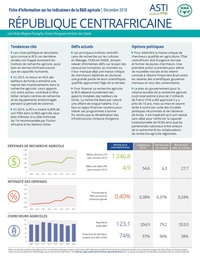Authors:
Léa Vicky Magne Domgho, Ernest Konguere and Gert-Jan Stads
Year:
2018
Publisher
International Food Policy Research Institute and Institut Centrafricain de Recherche Agronomique.
Back to:
Key trends
- The political and security crises experienced by CAR in recent years have had a severe impact on agricultural research institutes, both in terms of infrastructure and human capacity.
- With the return of donors to the country in 2015, agricultural research investments started to increase again. Donors were instrumental in helping to fund the rehabilitation of research centers and equipment damaged during the period of violence.
- As of 2016, CAR invested 0.40 percent of its AgGDP in agricultural R&D, which is well below the 1 percent minimum target recommended by the African Union and the United Nations.
Current challenges
- The country’s main crop and livestock research institutes, ICRA and ANDE, are severely challenged in terms of human resources: they lack a critical mass of PhD-qualified researchers, and a large portion of its most qualified researchers are approaching retirement age.
- Agricultural research in CAR is highly dependent on the volatile inflow of donor funding. Given the long-term nature of agricultural research, long-term sustainable funding for comprehensive research programs and the rehabilitation of research infrastructure is urgently needed.
Policy options
- If CAR is to build a critical mass of highly qualified agricultural researchers, the government needs to recruit and train young researchers without delay. Reducing the large salary gap between government and university scientists would be a necessary first step to motivate and maintain capacity over time.
- The government’s Plan for the Sustainable Recovery of Agricultural Research (with an estimated total cost of more than 2 billion CFA francs) was approved nearly a decade ago, but its implementation got delayed due to ongoing political unrest. This plan will need to be implemented without delay to strengthen ICRA’s institutional capacity and partnerships among research stakeholders, and increase regional collaboration in agricultural research.

